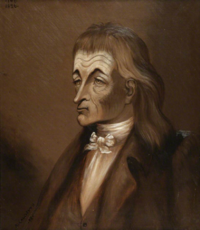Iolo Morgannwg
| Iolo Morganwg | |
|---|---|
 |
|
| Born | Edward Williams 10 March 1747 Pen-onn, Glamorgan, Wales |
| Died | 18 December 1826 (aged 79) |
| Occupation | Poet, literary forger |
| Language | Welsh |
| Nationality | Welsh |
Edward Williams, better known by his bardic name Iolo Morganwg ([ˈjɔlɔ mɔrˈɡanʊɡ]; 10 March 1747 – 18 December 1826), was an influential Welsh antiquarian, poet, collector, and literary forger. He was widely considered a leading collector and expert on medieval Welsh literature in his day, but after his death it was revealed that he had forged a number of his manuscripts, especially parts of the Third Series of Welsh Triads. Nonetheless, he had a lasting impact on Welsh culture, seen most notably in his foundation of the Gorsedd, and the philosophy he developed in his forgeries had a huge impact on the early neo-druid movement. His bardic name is Welsh for "Iolo of Glamorgan" (the county's name is spelt "Morgannwg" in modern Welsh). Iolo is the diminutive of "Iorwerth", a Welsh name often seen as equivalent to "Edward", although neither name is a translation of the other.
Edward Williams was born at , near Llancarfan in Glamorgan, Wales, and was raised in the village of Flemingston (or Flimston; Trefflemin in Welsh). He followed his father into a career as a stonemason. In Glamorgan he took an interest in manuscript collection, and learned to compose Welsh poetry from poets such as Lewis Hopkin, Rhys Morgan, and especially Siôn Bradford. In 1773 he moved to London where the antiquary Owen Jones introduced him to the city's Welsh literary community, and where he became a member of the Gwyneddigion Society: he would later also be active in the Cymreigyddion Society. In 1777 he returned to Wales, where he married and tried his hand at farming, but evidently met with no success. It was during this time that he produced his first forgeries.
...
Wikipedia
